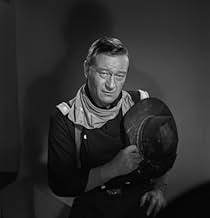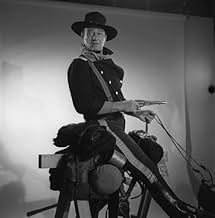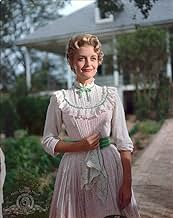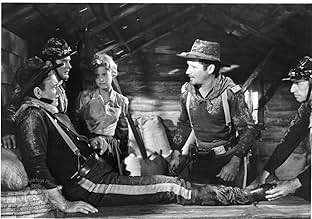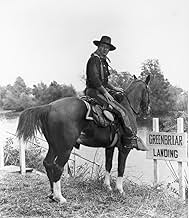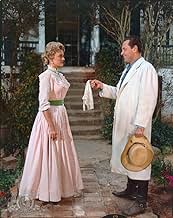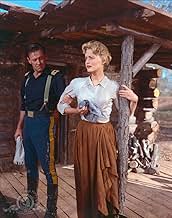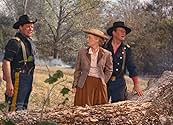IMDb RATING
7.1/10
13K
YOUR RATING
In 1863, a Union outfit is sent behind Confederate lines in Mississippi to destroy enemy railroads but a captive southern belle and the unit's doctor cause frictions within ranks.In 1863, a Union outfit is sent behind Confederate lines in Mississippi to destroy enemy railroads but a captive southern belle and the unit's doctor cause frictions within ranks.In 1863, a Union outfit is sent behind Confederate lines in Mississippi to destroy enemy railroads but a captive southern belle and the unit's doctor cause frictions within ranks.
- Director
- Writers
- Stars
- Awards
- 1 nomination total
- Director
- Writers
- All cast & crew
- Production, box office & more at IMDbPro
Featured reviews
The fields, woodlands and rivers of Tennassee drenched in summer sunlight are in stark contrast to the horrors of civil war as depicted in John Ford's "The Horse Soldiers". John Wayne's mission to lead a troop of Yankee soldiers behind Confederate lines to destroy a railway base vital to the South's supply lines is fraught with danger. Skirmishes inevitably result in injuries and death, the former often giving rise to amputations. Although made well before the time that the full appalingness of warfare come to be depicted in films such as "Saving Captain Ryan", from "Drums Along the Mohawk" onwards Ford never shirked the unpleasant. Incurable romantic that he was, he gave his work a hard edge whenever it was needed. Although the term "road movie" to categorise films based on journeys was not then in general usage, this fascinating work, with horses replacing cars, stands as one of the genres finest examples. And yet, judging from many of this site's user comments, it remains one of Ford's most under appreciated films. I find this rather strange as it contains most of the ingredients that are the hallmarks of those generally regarded as masterworks, westerns such as "The Searchers", "The Man Who Shot Liberty Valance" and "My Darling Clementine", not forgetting his glorious Irish romp, "The Quiet Man". A shrew is tamed, there is a measure of drunken knockabout and the soundtrack pulsates with rousing cavalry tunes and bugle calls. I have no quarrel with the fact that it is episodic rather than tightly knit. This somehow makes it all the more compatible with its journeying structure. Each episode on the way is brought out in sharp relief, be it the Southern belle's false hospitality and attempted betrayal, the central climax at the railroad station or the delightful interlude of the attack by the boy soldiers from the Confederate military academy (one of my favourite sequences from any Ford film). John Wayne plays what is almost a variation on his Ethan role in "The Searchers", his anger here not vent on Indians but on the medical profession which he holds responsible for his wife's death. His embittered relationship with his company's medical officer played by William Holden gives this otherwise picaresque film a strong dramatic unity. I can only advise those who consider this one of Ford's minor works to see it several times. From my own experience I find it emerges stronger on each viewing.
Director John Ford was notably sentimental about the actors and crew who had worked with him over the years in his film 'family.' Among these was an old stunt man and western wrangler, Fred Kennedy. Against his better judgment, Ford gave Kennedy a stunt ride in "The Horse Soldiers." Kennedy's horse fell, breaking the old actor's neck. The scene was retained in the final cut. But Ford was broken-hearted with guilt.
The "...and I didn't kill either one of them..." speech is one of my favorite Wayne moments. Plainly past his conventionality, the Marlowe character gives breathtaking short shrift to the unending pettiness and fallibility he encounters; Kirby, Kendall, congressional wannabes, reb deserters et.al. It's an exemplar of the 'Duke' personna: dubious provenance, grand stature, indomitable purpose and a trace of sentiment. I'l put it with Searchers, Liberty', and Shootist (Wallace Beery impersonation in True Grit aside) as one of his best efforts.
Ford's battle scenes are as usual patriotically free of blood and require no reflection but the imagery is great (you want to join the cavalry) and the detail outstanding. We hear the clanking of canteens and cookpots, an argument over the placement of latrines and see the only filmic presentation of the making of Sherman Neckties (warped rails). The Ford family is well represented though we miss Harry Carey Jr (and Paul Fixx must have been tied up with the Rifleman).
If we had to have a love interest, Maureen Ohara could have at least tied this to "Rio Grande" and furthered the Ford library.
Normally wonderful Bill Holden has only brief bright moments and is mostly going through the motions and hung-over here. Neither Wayne nor Ford were slouches when it came to curling whiskey but by his own admission Holden aggravated all and threatened production with reckless, drunken extracurriculae, breaking an arm falling from a bridge.
This film was an inspiration in grade school and a guilty pleasure since.
Ford's battle scenes are as usual patriotically free of blood and require no reflection but the imagery is great (you want to join the cavalry) and the detail outstanding. We hear the clanking of canteens and cookpots, an argument over the placement of latrines and see the only filmic presentation of the making of Sherman Neckties (warped rails). The Ford family is well represented though we miss Harry Carey Jr (and Paul Fixx must have been tied up with the Rifleman).
If we had to have a love interest, Maureen Ohara could have at least tied this to "Rio Grande" and furthered the Ford library.
Normally wonderful Bill Holden has only brief bright moments and is mostly going through the motions and hung-over here. Neither Wayne nor Ford were slouches when it came to curling whiskey but by his own admission Holden aggravated all and threatened production with reckless, drunken extracurriculae, breaking an arm falling from a bridge.
This film was an inspiration in grade school and a guilty pleasure since.
John Ford probably did more to glorify the old American Cavalry of the 19th Century than any other major Hollywood Director. But while the Civil War is an element that keeps turning up in his movies, he never actually did do the Civil War film he wanted to do - a biography of the career of Ulysses Grant. In his career he tackled the Civil War three times.
In PRISONER OF SHARK ISLAND he dealt with the story of Dr.Samuel Mudd, who was sentenced to life imprisonment for involvement in Lincoln's Assassination. In HOW THE WEST WAS WON, Ford did the segment dealing with the battle of "SHILOH", with Harry Morgan as General Grant and John Wayne as General Sherman. This film was the nearest that Ford ever got to his dream film. THE HORSE SOLDIERS was the only film that was devoted to a full study of the effect of the war in the South, on both Union and Rebel soldiers. While not, perhaps, the best that Ford could have achieved - he was in the twilight of his master career - it is a fine film none-the-less.
The story is based on an incident in 1863 known as Grierson's Raid. Cavalry leader Benjamin Grierson was sent by Grant into Alabama and Mississippi on a raid to attack a railway junction, supposedly to destroy it for strategic reasons. While it was important to knock the railway junction out of effective work, the real purpose was to tie up Confederate forces in these backwaters. Since December 1862 Grant was struggling to capture the city of Vicksburg, Mississippi, the last major Confederate stronghold on the Mississippi River. But try as he did Grant kept losing to the Confederates under Joseph Johnston and John C. Pemberton (the commander in Vicksburg). But Grant had noticed how Confederate cavalry men like Earl Van Dorn and Nathan Bedford Forrest had forced him to use men to protect his supply lines, and took valuable time away from him trying to fight off or track them down. He decided that Grierson, a first rate Cavalry leader, could do the same thing to Johnston. A very intelligent Confederate Commander, Johnston was nervous at unexpected difficulties. Grant reasoned that Grierson's men would panic Johnston, and cause him to waste time chasing him down.
As it turned out Grierson's Raid worked. The pinning down of large numbers of Rebel troops in Alabama and Missisippi was wonderful for Grant's Vicksburg campaign. It was the beginning of the successful conclusion of the campaign, as Johnston's attention was now split between trying to help support Pemberton and trying to reassure frightened southern populations in the hinterlands. Grierson got most of his men back to Northern lines. Vicksburg was able to hold out until July 4, 1863. It's fall (the day after Lee's defeat at Gettysburg) really marked the beginning of the end of the Civil War.
This incident is the basis for THE HORSE SOLDIERS. Ford concentrates on what the experience of the war must have been like in the Southern countryside. Certain things are taken from other incidents and battlefields. When a military school's cadets are brought into the field to try to catch or slow down John Wayne's men, Ford is really picking up on an incident in the war in Virginia, when the young cadets at the Virginia Military Institute came out to fight the Union troops under Sheridan in 1864. One can forgive the transition of the incident.
It has been pointed out that one of the characters, Colonel Secord (Willis Bouchey) is a splendid type - the political officer. Men like Secord (usually in the position of General) bedeviled both sides, because of their usually normal level of mediocrity or idiocy. A few rose to the job well - the best of the Northern political generals was "Black Jack" Logan, who would be a valuable associate of Sherman in the battles around Atlanta. But for every positive General Logan, there were thieves like Benjamin "Spoons" Butler, who feathered his nest as military governor of New Orleans (he supposedly stole even the silver spoons of the citizenry). Actually Secord is normally intelligent, and follows Wayne's strategy. But he is constantly looking ahead at post-war elections. Towards the end he even wonders if the White House beckons.
Another lovely moment shows the fraying of the Southern cause. Wayne and his men come across two Rebel deserters (Strother Martin and Denver Pyle) who have tied up the local sheriff (Russell Simpson). Wayne thanks Martin and Pyle for their unofficial assistance to the Northern cause,telling them which way they plan to go. While Martin chatters away (mentioning the strength of Rebel forces in the area), Wayne carefully knocks out Pyle and then Martin, and then unties Simpson and assists in tying up the two deserters. William Holden is watching this, and later asks why he helped Simpson. Wayne explains that he decided to feed the deserters false information about his own movements, as they would probably give the information to the Confederates later on anyway.
All the performances are fine, with Wayne in particular as a man who hates doctors and medicine for a valid personal reason. Holden is in a subordinate role but he gets some nice moments. So does Constance Towers, in a rare leading part, as a passionate Confederate supporter who gradually gets to like Wayne. Carleton Young, as a former friend of Wayne, has a moment trying to rally Confederate forces at the railway depot.
It is a good Ford film, and makes one wish that Ford had made his Ulysses Grant biography.
In PRISONER OF SHARK ISLAND he dealt with the story of Dr.Samuel Mudd, who was sentenced to life imprisonment for involvement in Lincoln's Assassination. In HOW THE WEST WAS WON, Ford did the segment dealing with the battle of "SHILOH", with Harry Morgan as General Grant and John Wayne as General Sherman. This film was the nearest that Ford ever got to his dream film. THE HORSE SOLDIERS was the only film that was devoted to a full study of the effect of the war in the South, on both Union and Rebel soldiers. While not, perhaps, the best that Ford could have achieved - he was in the twilight of his master career - it is a fine film none-the-less.
The story is based on an incident in 1863 known as Grierson's Raid. Cavalry leader Benjamin Grierson was sent by Grant into Alabama and Mississippi on a raid to attack a railway junction, supposedly to destroy it for strategic reasons. While it was important to knock the railway junction out of effective work, the real purpose was to tie up Confederate forces in these backwaters. Since December 1862 Grant was struggling to capture the city of Vicksburg, Mississippi, the last major Confederate stronghold on the Mississippi River. But try as he did Grant kept losing to the Confederates under Joseph Johnston and John C. Pemberton (the commander in Vicksburg). But Grant had noticed how Confederate cavalry men like Earl Van Dorn and Nathan Bedford Forrest had forced him to use men to protect his supply lines, and took valuable time away from him trying to fight off or track them down. He decided that Grierson, a first rate Cavalry leader, could do the same thing to Johnston. A very intelligent Confederate Commander, Johnston was nervous at unexpected difficulties. Grant reasoned that Grierson's men would panic Johnston, and cause him to waste time chasing him down.
As it turned out Grierson's Raid worked. The pinning down of large numbers of Rebel troops in Alabama and Missisippi was wonderful for Grant's Vicksburg campaign. It was the beginning of the successful conclusion of the campaign, as Johnston's attention was now split between trying to help support Pemberton and trying to reassure frightened southern populations in the hinterlands. Grierson got most of his men back to Northern lines. Vicksburg was able to hold out until July 4, 1863. It's fall (the day after Lee's defeat at Gettysburg) really marked the beginning of the end of the Civil War.
This incident is the basis for THE HORSE SOLDIERS. Ford concentrates on what the experience of the war must have been like in the Southern countryside. Certain things are taken from other incidents and battlefields. When a military school's cadets are brought into the field to try to catch or slow down John Wayne's men, Ford is really picking up on an incident in the war in Virginia, when the young cadets at the Virginia Military Institute came out to fight the Union troops under Sheridan in 1864. One can forgive the transition of the incident.
It has been pointed out that one of the characters, Colonel Secord (Willis Bouchey) is a splendid type - the political officer. Men like Secord (usually in the position of General) bedeviled both sides, because of their usually normal level of mediocrity or idiocy. A few rose to the job well - the best of the Northern political generals was "Black Jack" Logan, who would be a valuable associate of Sherman in the battles around Atlanta. But for every positive General Logan, there were thieves like Benjamin "Spoons" Butler, who feathered his nest as military governor of New Orleans (he supposedly stole even the silver spoons of the citizenry). Actually Secord is normally intelligent, and follows Wayne's strategy. But he is constantly looking ahead at post-war elections. Towards the end he even wonders if the White House beckons.
Another lovely moment shows the fraying of the Southern cause. Wayne and his men come across two Rebel deserters (Strother Martin and Denver Pyle) who have tied up the local sheriff (Russell Simpson). Wayne thanks Martin and Pyle for their unofficial assistance to the Northern cause,telling them which way they plan to go. While Martin chatters away (mentioning the strength of Rebel forces in the area), Wayne carefully knocks out Pyle and then Martin, and then unties Simpson and assists in tying up the two deserters. William Holden is watching this, and later asks why he helped Simpson. Wayne explains that he decided to feed the deserters false information about his own movements, as they would probably give the information to the Confederates later on anyway.
All the performances are fine, with Wayne in particular as a man who hates doctors and medicine for a valid personal reason. Holden is in a subordinate role but he gets some nice moments. So does Constance Towers, in a rare leading part, as a passionate Confederate supporter who gradually gets to like Wayne. Carleton Young, as a former friend of Wayne, has a moment trying to rally Confederate forces at the railway depot.
It is a good Ford film, and makes one wish that Ford had made his Ulysses Grant biography.
As the Civil War goes against the North, General Grant (Stan Jones) is unable to take the Confederate fortress of Vicksburg because the Confederates have it so well defended... He realizes necessity of cutting off that city's supply sources..
Col. John Marlowe (John Wayne) is assigned to take a small brigade of cavalry from Tennessee, ride hundreds of miles into the Confederate territory and destroy the railroad at Newton Station, Mississippi, thereby cutting the supply line to Vicksburg... To do it, he will have to avoid all contact with rebel forces until he has reached his target...
The first problem Marlowe encounters is Major Hank Kendall (William Holden), an obstinate surgeon who will be accompanying the force... Marlowe has the expected contempt of the combat soldier for his colleague who carries no arms... In addition, when Kendall asserts his rights as an officer in the medical corps to declare unfit any soldier he considers so, Marlowe and Kendall clash...
The next problem is Marlowe's second in command, Col. Secord (Willis Bouchey), who makes no secret of his plans to use his military career to further his strong political ambitions...
The third problem is the high-spirited belle Hannah Hunter (Constance Towers). This violent Southern patriot gives him an initial hard time... The Yankee soldiers stay at her plantation soon after they cross into the Confederacy... When Hannah learns their plans, Marlow is forced then to take her along with them for security reasons...
Holden and Wayne (violently opposing strong personalities) perform their assignment with a consummate force, intensity, and expert teamwork... Constance Towers, too, registers a vital presence... At their first dinner, she passes Wayne a platter of chicken... As she leans over, threatening to divulge her engaging décolletage, she says: 'Oh come now, Colonel, a man with a great big frame like yours can't just nibble away like a little titmouse. Now what was your preference, the leg or the breast?'
Incorrigibly sentimental and romantic in his big cavalry epic, Ford's motion picture is full of heroic cavalry on the skyline imagery... Among the more affecting scenes is that in which a harsh compassionate Wayne comforts a dying young soldier and the one in which he registers his love for Towers... There is also a compelling sequence, pure John Ford, in which a group of teenage cadets march out from a Southern military academy to take on the enemy, which makes manifest to battle boys and pulls a retreat, leaving the kids cheering...
Col. John Marlowe (John Wayne) is assigned to take a small brigade of cavalry from Tennessee, ride hundreds of miles into the Confederate territory and destroy the railroad at Newton Station, Mississippi, thereby cutting the supply line to Vicksburg... To do it, he will have to avoid all contact with rebel forces until he has reached his target...
The first problem Marlowe encounters is Major Hank Kendall (William Holden), an obstinate surgeon who will be accompanying the force... Marlowe has the expected contempt of the combat soldier for his colleague who carries no arms... In addition, when Kendall asserts his rights as an officer in the medical corps to declare unfit any soldier he considers so, Marlowe and Kendall clash...
The next problem is Marlowe's second in command, Col. Secord (Willis Bouchey), who makes no secret of his plans to use his military career to further his strong political ambitions...
The third problem is the high-spirited belle Hannah Hunter (Constance Towers). This violent Southern patriot gives him an initial hard time... The Yankee soldiers stay at her plantation soon after they cross into the Confederacy... When Hannah learns their plans, Marlow is forced then to take her along with them for security reasons...
Holden and Wayne (violently opposing strong personalities) perform their assignment with a consummate force, intensity, and expert teamwork... Constance Towers, too, registers a vital presence... At their first dinner, she passes Wayne a platter of chicken... As she leans over, threatening to divulge her engaging décolletage, she says: 'Oh come now, Colonel, a man with a great big frame like yours can't just nibble away like a little titmouse. Now what was your preference, the leg or the breast?'
Incorrigibly sentimental and romantic in his big cavalry epic, Ford's motion picture is full of heroic cavalry on the skyline imagery... Among the more affecting scenes is that in which a harsh compassionate Wayne comforts a dying young soldier and the one in which he registers his love for Towers... There is also a compelling sequence, pure John Ford, in which a group of teenage cadets march out from a Southern military academy to take on the enemy, which makes manifest to battle boys and pulls a retreat, leaving the kids cheering...
Did you know
- TriviaThe film marked the beginning of mega-deals for Hollywood stars. John Wayne and William Holden received $775,000 each, plus 20% of the overall profits, an unheard-of sum for that time. The final contract involved six companies and numbered twice the pages of the movie's script. The film, however, was a financial failure, with no profits to be shared in the end.
- GoofsIn the shot right after Hank Worden throws the torch onto the cotton bales, look at the upper left of the screen. You will see an airplane flying from right to left.
- Quotes
Miss Hannah Hunter: [bending over with a plate of chicken, revealing ample cleavage] Do you prefer the leg... or the breast?
Col. John Marlowe: I've had quite enough of both, thank you.
- ConnectionsFeatured in Directed by John Ford (1971)
- SoundtracksI Left My Love
by Stan Jones
- How long is The Horse Soldiers?Powered by Alexa
Details
Box office
- Gross US & Canada
- $1,753,526
- Runtime
- 2h(120 min)
Contribute to this page
Suggest an edit or add missing content


